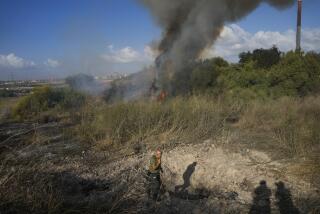Israel Tests New Anti-Missile Missile : Mideast: Any attacker ‘will bring upon himself great tragedy,’ Shamir warns. The nation’s concerns are headlined in the press.
- Share via
JERUSALEM — Israel on Thursday test-fired its new anti-missile missile, the Arrow, amid general apprehension about Iraqi charges that Israel is preparing to give the United States a hand in its military operation in Saudi Arabia.
Prime Minister Yitzhak Shamir said Israel faces “a threat to its security and well-being” and warned that any attacker “will bring upon himself a great tragedy.”
He said Israel has “no intention of attacking any of its neighbors, but it knows how to deal with anyone who tries to attack it.”
There was widespread speculation that the timing of the Arrow test was related directly to the threat from Iraq, but military officials insisted that the test had been planned for some time.
“The Iraqis did not have to wait for the Arrow to know that Israel has answers to their threats toward Israel,” Brig. Gen. Nachman Shai, the chief military spokesman, told reporters.
The Arrow, funded in large part by the United States, is the first Western weapon designed to destroy enemy short-range ballistic missiles. It has a range of about 120 miles and moves at five times the speed of sound. Israeli military sources say they expect it to be in active service within five years.
Announcement of the test firing came as the Israeli press reacted strongly to charges broadcast late Wednesday by Iraqi President Saddam Hussein that Israeli air force planes were being painted with U.S. markings for use against Iraqi forces.
Israeli newspapers used red headlines--reserved for the most urgent stories--over the statement from Baghdad, which threatened immediate Iraqi retaliation.
The daily Yediot Aharonot screamed, “Fear in Israel: Conflagration in the Gulf Will Reach Us as Well.”
Hadashot, a popular tabloid, headlined its story: “The Ruler of Iraq Threatens: ‘We Will Attack Israel.’ ”
A headline in Haaretz, perhaps the most-respected newspaper in Israel, said, “Iraq might initiate a missile attack against Israel.”
Radio and television stations offered instructions on how to put on a gas mask and what to do in the event of a chemical attack. Do not go into a basement, they warned, because poison gas is heavier than air and settles in low places. Cover the face with wet rags and wear protective clothing.
A Western embassy reportedly was considering asking its government whether to compile a list of nationals for a possible advisory to leave Israel.
Gen. Shai, the Israeli military spokesman, denied categorically that Israeli aircraft are being readied for action against Iraq.
The thrust of editorial comment was that Baghdad’s effort to implicate Israel in the deployment of U.S. troops and planes in Saudi Arabia suggested that Hussein was trying to justify in advance an attack on Israel.
Other military sources suggested that the Iraqi statement was designed to involve Israel in the gulf conflict so as to rally Arab nations against the United States.
The Israel Defense Forces are in a state of readiness, but no special precautions have been taken as regards the civilian population, except for the distribution of gas masks in Tel Aviv and in Galilee, a move that had been planned for some time.
Former Defense Minister Yitzhak Rabin, who led the Israeli armed forces in the Arab-Israeli War of 1967, declared: “We must not make light of the Iraqi announcement. The intention of this announcement is to acquit Iraq in the eyes of the Arabs and accuse the U.S. of collaboration with Israel.”
He said the Iraqi statement “is aimed at hurting the U.S. and diverting the argument to the old conflict with Israel.”
Retired Gen. Rafael Eitan, who commanded the armed forces in the invasion of Lebanon, said, “There is no need for anxiety about what is happening in the Persian Gulf . . . and the way it has been related through the media.”
More to Read
Sign up for Essential California
The most important California stories and recommendations in your inbox every morning.
You may occasionally receive promotional content from the Los Angeles Times.













